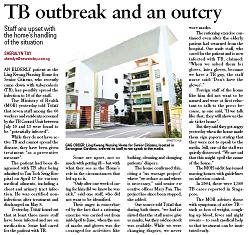 Categories: Singapore
Categories: Singapore
This report by Today concerning how TB was spread from an in-patient of a nursing home to the nursing staff and later trying to forbid them to voice their concerns is a sad reminder of how bottom-lines can sometimes be counter-productive.
In the incident, "the use of masks and gloves was discouraged for activities like bathing, cleaning and changing patients' diapers" by the nursing staff. This was done to reduce wastage. I find this totally unacceptable.
Nursing is a dirty job. Nursing staff are required to bathe, clean up patients and changing diapers, among others. All this involve some degree of dirtiness. Wearing gloves is not only expected but a must for hygiene. How can the management refused such basic hygienic measures for its staff?
According to the senior executive officer, "it was a "no wastage project" where "we reduce as and where is necessary." Reducing wastage is certainly encouraged but it should be done with prudence and common sense. To reduce as and where necessary is certainly the right approach but it should be looked at from the point of the users. If management staff who works behind the desk wishes to use the glove to protect the the hands from getting rough or dirty; or if the nursing staff asked for more stapler so they don't have to spend time looking for one, then these should certainly be stopped. As far as using gloves and masks are concerned, this is a standard teaching as far as basic hygiene is concerned. Therefore to deny the nursing staff from using these protective gear is certainly wrong and improper.
The way the management is trying to cover up the incident is also wrong. I can understand why the management wanted to prevent the nursing staff from talking to the press. Obviously the management is afraid that the fallout from this episode will harm the image of the nursing home, if not reprimands from the Ministry. Anyone with some grey matter will tell you that goodwill is the best policy when dealing with mistakes. I am sure if the management has apologised or showed more concerned to their staff, this unfortunate incident would not have been reported and lessons that could be learned will be lost.
The nursing staffs were not upset about contracting TB from the patient. They are rightly upset about how they were not given the necessary protective gear even after the patient was diagnosed to have TB. Risk of exposure to disease comes with the job. However, if a risk is present, nursing staff should be given adequate protection to minimise the likelihood of disease spread. By so doing, the staff can give their best in their duty as they do not have to worry too much of their own safety.
This episode has reminded me of the contrasting ways SARS crisis was handled between Singapore/Hong Kong and Taiwan back in 2003. In Singapore and Hong Kong, hospital staffs were given adequate protection before they were deployed to the front line. This was in contrast with the Taiwanese, with many of the hospital staffs and relatives who were just quarantined within the hospital ground to fend for themselves without the provision of adequate personal protection. The results were clear for all to see - hospital staffs in Singapore/Hong Kong performed admirably, carried out their duty with commitment, dedication and pride; whereas those in Taiwan were seen trying to 'escape' and break the quarantine. I think the question here is not about personal integrity or commitment. It is a question of taking calculated risks.
Another lesson here is that bottom line should be achieved with common sense. It is true that everything costs money and to cut cost, use less of everything. This is too simplistic because every profession has its own peculiarities and priorities, hence sometimes administrators need to go to the ground to learn and discuss how best bottom lines can be achieved. Like this case, because of the wrong priorities and the lack of understanding of the nature of the profession, this has created health hazards, loss in work-hours and the extra cost of medical treatment and poor publicity.
Hopefully this incident would serve as a timely reminder to all medical facility administrators on the importance of common sense and priorities when trying to cut cost. This is especially pertinent with today's shadow of a possible bird flu pandemic.






No comments:
Post a Comment